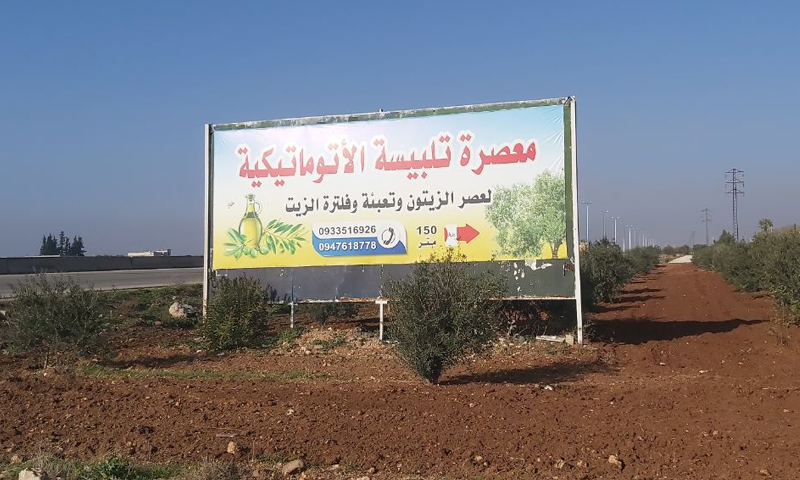



Homs – Orwah al-Mundhir
In an olive oil pressing facility on the Homs-Hama highway, northern Homs countryside, about 20 olive farmers gather daily, waiting for their harvest to be ground and transformed into oil while predicting in advance a “disappointing” season.
“You can see a look of disappointment on most farmers’ faces,” Hussein, a driver of one of the tractors transporting olives to the mill, told Enab Baladi. He indicated that oil production had fallen to half of what it was in 2019.
The production costs of agricultural crops rose after fertilizers and pesticide prices doubled in price, as they followed the US dollar’s pricing on the black market. The fuel price also increased in the market after the government issued some decisions during the last months, thus increasing the cost of land tilling and irrigation.
The labor force and mills’ workers’ wages also doubled or increased more than in previous years. The price of an oil tank, weighing 16 kilograms, rose from 60,000 Syrian pounds (SYP = 21.127 USD) to about 100,000 (SYP = 35.211 USD).
“The government had set the olive pressing wages at 55 (SYP = 0.019 USD) per kilogram, while it was 14 (SYP = 0.005 USD) in 2019. The labor force wages also increased from 10 (SYP = 0.004 USD) per kilogram in 2019 to 30 (SYP = 0.011 USD) this year,” Abu Hisham, an olive farmer from the al-Rastan city, told Enab Baladi.
The Syrian pound lost more than four times its value during the last year. The pound’s exchange rate during the olive-pressing season in 2019 ranged between 550 and 650 per 1 US dollar. In 2019, the olive oil tank was worth 92 USD, while in this year, the tank’s price reached 36 USD, as the Syrian pound’s exchange reached 2,720 against the US dollar in 2020, according to the Syrian Pound Today website.
Homs province has 65 olive oil presses, of which 20 presses have stopped working, and 45 remained in service, said the head of the fruit trees department of Homs Agriculture Directorate, Naji Saed, to the pro-government al-Watan newspaper. The government has determined 6 percent of oil production to be left by the farmer to the mill owner if the farmer could not pay the pressing cost. The olive pressing facilities charge 65 (SYP = 0.023 USD) per kilogram, or 55 (SYP = 0.019 USD) if the farmer left the pomace (pulp)_ the solid remains of olives after pressing that is used for heating|_ to the olive mill’s owner.
Abu Hisham pointed out that the olive crop transportation prices had tripled than they were in 2019, while the production rate had fallen by half. “last year, every six kilograms of olive oil produced one kilogram of oil. This year, however, every kilogram of oil required the pressing of 13 kilograms of olives,” Abu Hisham said.
Adulterated olive oil has spread notably in the northern Homs countryside’s markets. The adulteration is done by mixing olive oil with vegetable oil, by one third for vegetable oil and two thirds for olive oil; in this way, olive oil is diluted with cheaper oil.
The olive oil adulteration phenomenon has spread “widely,” mainly because of low production, which in turn caused “trust issues between the seller and the buyer,” Samer al-Sheikh, an olive oil trader in northern Homs countryside, told Enab Baladi. He added that only experienced oil merchants could tell whether the oil was adulterated or not, which caused many people to fall victims to oil adulteration.
As a result of oil adulteration, some buyers insist on heading directly to the presses to watch the process up close. Adnan Barbar, a resident of al-Zaafaraniyah village, told Enab Baladi that he agrees with one of the farmers on supervising the tank’s filling from the oil pipe and then putting it aside. Barbar added, “oil is the only natural pure nutritional material that we are still eating with no preservative or chemical substances.”
“Over the past 15 years, the region has not experienced such a weak production as of this year,” a sixty-something-year-old farmer from Ghurnatah village, Zakaria, told Enab Baladi. He added, “olive farmers are used to varying productions of olive trees from year to year, as people used to say, “olive trees bear fruits only every other year.” Nevertheless, Zakaria said that farmers are not used to low productions of olive oil.
Enab Baladi’s correspondent talked to some farmers and agricultural engineers who attributed the low quantity of oil production to high temperatures last summer.
Agricultural engineer Walid Kajo, from Talbiseh city, said to Enab Baladi that the successive heatwaves last summer are the main reason for the decrease in oil extraction. “In high temperatures, olive trees need more water, which affects the physicochemical properties of olive and reduces the rate of oil extraction. When the heatwave lasted nearly two months, the oil production dropped this year.”
Kajo said temperatures ranged between 43 and 50 degrees Celsius, while the average temperatures in summer are between 29 and 36 degrees. He added, the low price of an olive oil tank does not cover the production costs and efforts provided by farmers.
The olive tree is one of the most essential fruits bearing trees in Syria and spreads widely in Homs province. According to the head of the fruit tree department of Homs Agriculture Directorate, Naji Saed, the planted area for the current year covered 96.5 thousand hectares (965,000,000 square meters). The number of olive trees reached 16 million, 13.7 million of them are productive or about to be productive.
if you think the article contain wrong information or you have additional details Send Correction